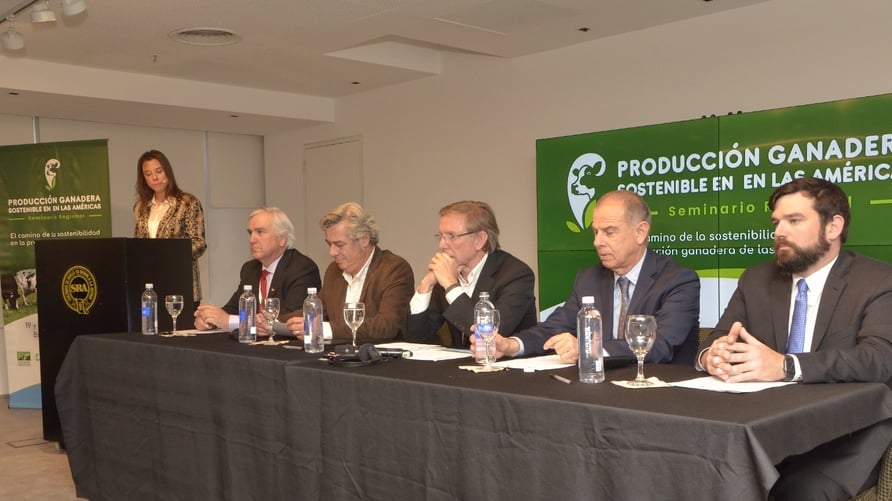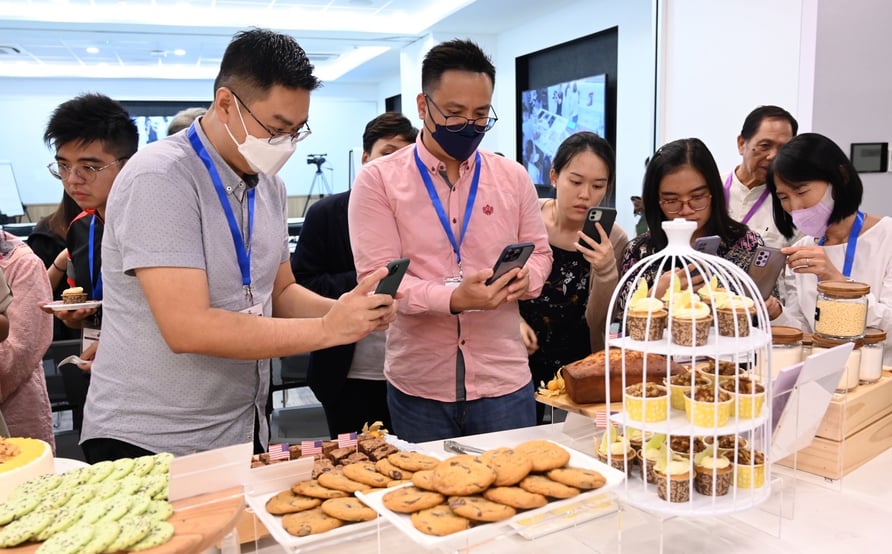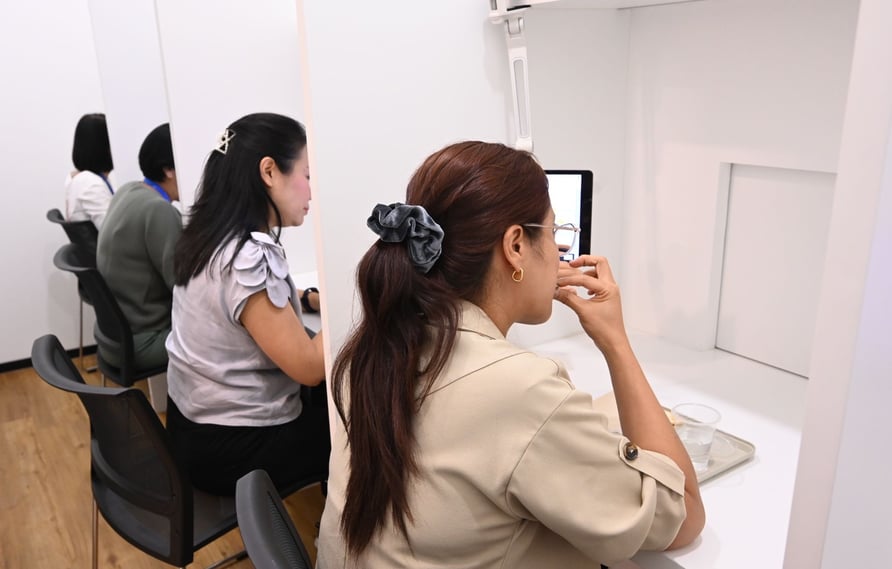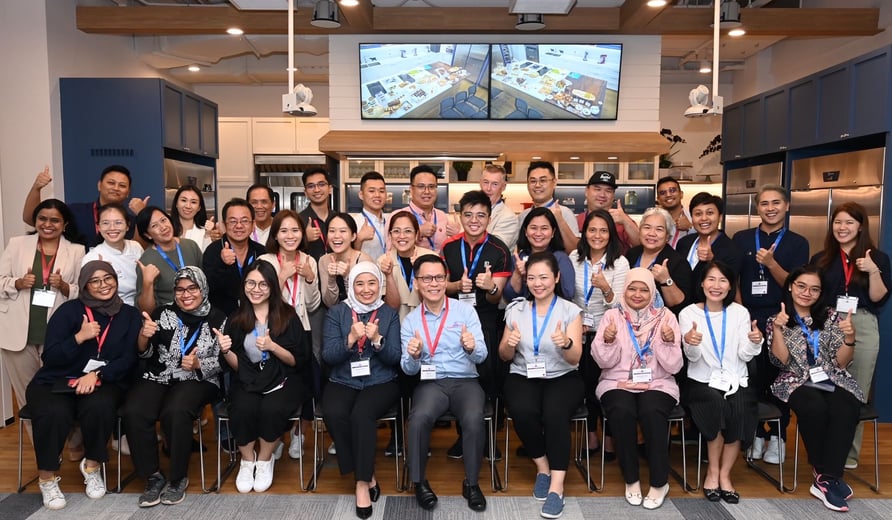HIGHLIGHTS: April 21, 2023
• New collaboration to lead in global climate discussions
• Member webinar on Indian certificate
• Bakery innovation workshop at the U.S. CDE
• SEA outlook webinar
• USDEC supports FAO’s work on women in agri-food systems
• Market Summary: GDT up across the board
• Market briefs: India denies import intent; NZ and EU milk production; Japan SMP stocks
• USDEC meets with Cuban officials
• APHIS certificates for Australia, Israel
• Company news: Int’l Dairy Products, Baltic Dairy Board, Yili, Junlebao
Featured
New collaboration to take larger role on global climate, agriculture and trade discussions
On April 20, representatives from USDEC, NMPF, the Pan American Dairy Federation (FEPALE) and the National Agricultural Organizations (FARM) from Argentina, Brazil, Paraguay, Uruguay, Chile, Bolivia and Colombia adopted a set of joint principles aimed at advocating globally for science-based, forward-looking public policy on the issues of agriculture, climate and trade.
“Too often, policies intended to reduce human environmental impact overlook the sector’s positive contributions and fail to adequately consider the diverse circumstances and unique needs of livestock producers in different regions,” the organizations said in a statement of Principles of Engagement. The groups pledged to work together on a global level “to insist that efforts intended to promote more sustainable agri-food systems are driven by science [and] empirical evidence, avoid ideology, reject one-size-fits-all approaches, reflect the realities of food production, encourage sustainable productivity growth, incentivize trade, and put producers first.”
Under the agreement’s language, the groups will coordinate efforts on dairy, livestock and trade for global food systems and climate conferences, like the UN Food Systems Summit Stocktaking Moment in July and COP28 in November. The organizations aim to work together and with their respective governments to play a role in shaping the discussion around agriculture’s role in a sustainable future. (Click here for a joint USDEC/NMPF press release on the agreement.)

Seated, left to right: Eduardo Schwerter, president of FEPALE; Nicholás Pino, president of FARM; Juan Bahillo, Argentina’s secretary of agriculture; Jaime Castaneda, USDEC executive vice president, Policy Development and Strategy; and Nick Gardner, USDEC senior vice president, Sustainability and Multilateral Affairs, at the signing of a set of principles to deepen collaboration on issues of livestock, agriculture, climate and trade this week in Buenos Aires.
Details of the principles
The four groups laid out an 11-point program to support collective engagement to demonstrate the livestock sector’s contribution to sustainable food systems and promote sustainable productivity growth. The agreed principles includes pledges to:
- Encourage a greater presence of agriculture officials in climate policy deliberations, with support from the Inter-American Institute for Cooperation on Agriculture (IICA) and other relevant organizations.
- Elevate the focus on food and nutrition security in all agri-food deliberations and highlight nutritional, social and economic trade-offs associated with policy change.
- Promote the essential role of trade in achieving more sustainable agri-food systems.
- Support greater access to climate funding and market-based incentives for producers in the Americas to strengthen adaptation, promote mitigation and scale implementation of science-based practices, technologies and innovations.
To read the full principles document, click here.
Argentine seminar
The signing of the agreement came at the end of a two-day seminar co-hosted by the four groups this week in Buenos Aires. The event, “The Road to Sustainability in Livestock Production in the Americas,” brought together influential leaders from across the livestock sectors of the Mercosur region and beyond. Jaime Castaneda, executive vice president, Policy Development and Strategy, and Nick Gardner, senior vice president, Sustainability and Multilateral Affairs, represented USDEC.
The seminar demonstrates how the livestock sector and trade can contribute to sustainable food systems. Attendees heard from global experts and discussed ways to reduce greenhouse gas emissions while remaining viable for the next generation of farmers.

Left to right: Manuel Otero, director-general of IICA, along with Nick Gardner, Eduardo Schwerter and Jaime Castaneda during the panel discussion, “Challenges for Latin America and Global Livestock Facing the COP.”
Market Summary
USDEC slates member webinar on India market access
India’s government issued a new model dairy health certificate on March 31, as noted in USDEC’s Member Alert of April 3. USDEC’s Market Access and Regulatory Affairs and Trade Policy teams are continuing to brainstorm potential options to re-open this market to U.S. dairy exports given the consistent member interest. USDEC will hold a webinar on April 27 at 2 p.m. ET (11 a.m. PT) to discuss the current situation and gauge member feedback on potential next steps.
Click on the Member Alert for more information and to register for the webinar. Please contact Sandra Benson at sbenson@usdec.org with questions.
Bakery innovation workshop at U.S. CDE shows 22 food industry professionals the benefits of U.S. permeate
On April 12-13, the U.S. Center for Dairy Excellence (U.S. CDE) hosted a second bakery innovation workshop for Southeast Asian bakery and confectionery manufacturers (the first took place in March). Twenty-two food industry professionals from 16 companies in Singapore, Malaysia, Indonesia, Thailand and the Philippines attended the two-day event, titled “Bakery Innovation: Harnessing the Power of U.S. Dairy Permeate.”
Day 1 focused on classroom instruction and application brainstorming. USDEC staff from the Southeast Asia office led a series of presentations highlighting the multifaceted benefits of using U.S. dairy permeate to develop or expand product lines, U.S. dairy supply and sustainability advantages, bakery trends and consumer insights.
Two additional features of the workshop brought the classroom instruction to life: 1) a product showcase and tasting featuring permeate-containing baked goods, and 2) a sensory evaluation trial using the U.S. CDE’s sensory lab.
Using the learnings from the day, Martin Teo, USDEC Southeast Asia’s technical director, food applications, led participants through a brainstorming session for new products that they would create on Day 2 of the workshop.

Workshop participants expressed strong interest in using U.S. permeate in bakery and confectionery applications. Here they photograph items in the product showcase on Day 1.

Workshop participants taste products in the U.S. CDE sensory lab. The tasting panel marked the first time USDEC conducted a sensory evaluation in the lab as part of a workshop.
On Day 2, attendees went to Singapore Polytechnic’s Food Innovation and Resource Center (FIRC) Mix and Bake Lab, where they used their first day of learnings to create their own bakery products using permeate. By sampling each other’s creations, participants were able to experience the ingredient’s functional nutritional and sensory attributes and the impact on the products they developed.
In peer voting, two products tied as the crowd favorites: Sundried Tomato Muffin and Chocolate Orange Spice Tart.
In addition to the training, four USDEC members gave presentations on their companies, products and services, and Donna Berry, food scientist, editor and consultant with Dairy & Food Communications Inc., provided a virtual presentation on global trends and new product launches.
The next two U.S. CDE innovation workshops on July 3-4 and July 5-6 will focus on health and wellness. For more on the previous bakery innovation workshop, see Global Dairy eBrief, March 10, 2023.

Workshop participants and USDEC staff at the U.S. CDE.
SEA webinar expresses optimism for dairy demand growth
Speakers at USDEC’s April 18 webinar, “Global Dairy Market Outlook—Signposts for 2023,” consistently noted that despite some substantial economic headwinds (notably inflation and its impact on consumer sentiment and purchasing power), overall dairy demand fundamentals remain solid and dairy demand growth is expected this year and in 2024. The webinar attracted 177 attendees from the Philippines, Indonesia, Singapore, Thailand and Malaysia.
Panel speakers Noel Navin with Agropur and Ken Lim with Darigold provided robust commentary on the advantages of buying from the U.S. and outlined the virtues of taking a longer-term, consistent approach to purchasing to meet supply needs (versus sporadic buying at the lowest price, trying to time when markets hit bottom). Speakers also highlighted why the U.S. is ideally positioned to consistently meet rising Southeast Asian demand for high-quality dairy ingredients over the long term.
USDEC shows support for FAO’s work to elevate the status of women in agri-food systems
USDEC President and CEO Krysta Harden and vice president of Sustainable Nutrition Janice Giddens were invited to the U.S. launch of FAO’s Report on the Status of Women in Agrifood Systems. Attended by high-level dignitaries and policymakers, this event provided USDEC with opportunities to meet global decision makers and highlight the important role that dairy and U.S. dairy exports play in empowering women through better nutrition and improved economic conditions.
The FAO report uses new data and analyses to demonstrate how improving gender equality and women’s empowerment are necessary for the transition toward sustainable and resilient agri-food systems. For instance, women engaged in wage employment in agriculture earn 82 cents for every dollar that men earn. Gender and wage equality would allow women to have more financial independence. This would improve their purchasing power for nutritious foods, such as dairy, for themselves and their families.
Report supports ongoing efforts
As the Sustainability and Multilateral Affairs (SAMA) department continues to pursue pro-trade language in current policy negotiations at the Committee on World Food Security (CFS), the data provided in this report will support the department’s efforts.
As a reminder, in past negotiations on gender equality, Giddens vociferously pushed back against language that sought to malign the role of international trade and restrict women’s access to markets. In her comments during the negotiations, which included member states, civil society and UN staff, Giddens stated: “Market access is critical for food and nutrition security. We should address the issues that prevent women from accessing markets instead of putting more obstacles in their way.” Following these comments, pro-trade language was introduced and supported by member states. Still, USDEC staff will need to continue to follow these negotiations closely and work with allies to remind stakeholders that trade is a critical driver of food and nutrition security.
More to come
USDEC will continue to represent the export interests of U.S. dairy producers, processors and traders in these globally focused events by contributing subject matter expertise and building its network of policymaker and thought leader allies. These efforts are essential to promoting the role of trade in sustainable food systems and maintaining and expanding market access for healthy, sustainably produced U.S. dairy products.
Market Summary
GDT surprises with across-the-board gains
The Global Dairy Trade (GDT) Price Index jumped 3.2% at the April 18 auction, with price gains for all major products across nearly every contract period. It was the first increase since Feb.7 and only the second gain in the last nine auctions. In addition, the results far outpaced pre-auction futures expectations, particularly for SMP and butter.
The average winning SMP price jumped 7% to US$2,776/MT. It was the biggest single-auction gain in SMP since September 2021. SGX-NZX futures markets projected an increase in SMP for the auction but more in the region of +1%.
Butter rose 4.9% to US$4,821/MT when SGX-NZX was expecting a decline of almost the same magnitude. SGX-NZX saw WMP declining 2%—it rose 1%.
The results were not only surprising because they bucked futures expectations; they were surprising because market conditions have not changed dramatically. Supply remains more than sufficient, with the U.S. and EU continuing to post gains in the lead-up to the spring flush. Demand remains sluggish. Inflation, economic growth and a bunch of risks to the downside and unknowns still abound.
The big difference between the April 18 and April 5 auctions—and the main reason for this week’s rebound—was the much higher profile of the Middle East and, to a lesser extent, Southeast Asia and Africa. Middle Eastern buyers led SMP purchasing and increased both SMP and WMP volume versus the previous year and the previous auction. Southeast Asia also increased its WMP purchase volume compared to the April 5 event, and Africa showed up for butter, buying the biggest volume.
It remains to be seen whether the increased participation from outside of China will continue, although there are few signs to suggest it will.
In other GDT news…
Darigold plans to begin offering SMP on GDT starting in June, with the potential to add more products at a later stage. Darigold CEO Joe Coote said the move is part of the company’s plan to be a “top-tier global producer.”
“Working with GDT expands our reach into more markets and to more customers, and is another step on this journey,” he added.
Market briefs
Below is a quick roundup of recent market news and developments:
- Year-over-year New Zealand milk production increased 0.3% in March. It was the third straight monthly gain, but the lowest of the three, and it comes as the 2022/23 season winds down.
- DairyNZ reports that New Zealand cow numbers fell 1.3% in 2021/22 to 4.84 million head. It was the fourth straight annual decline. New Zealand’s herd size peaked in 2014/15 at just over 5 million head.
- India’s Minister for Fisheries, Animal Husbandry and Dairying denied reports that India would be forced to increase dairy imports for the current fiscal year because of low milk production growth (see Global Dairy eBrief, 4/14/23). He specifically addressed butter and ghee imports but did not mention SMP. The minister emphasized that there was no shortage of milk in India and that the government was closely monitoring the situation.
- With all but Cyprus reporting, year-over-year EU27+UK milk production increased 1.1% in February. Of the top six producers, only France (-1.1%) posted a decline.
- Japan’s SMP inventory dropped below 80,000 MT for the first time in three years. Stocks at the end of March measured 77,989 MT. Inventories swelled over the last few years as processors were forced to channel milk to the dryer due to reduced consumption caused by COVID restrictions. They hit a record 104,200 MT in May 2022, when the dairy sector began a program specifically to reduce them (using food-grade SMP in feed, opting for domestic SMP over imports and other measures). Despite the reduction, stocks remain at historically high levels and the reduction efforts are expected to remain in place until March 2024. (USDEC Japan office; Eurostat; DairyNZ; Times of India, 4/15/23)
Market Access & Regulatory Affairs
USDEC meets with Cuban deputy foreign minister
USDEC has long supported efforts to eliminate impediments to U.S. dairy trade with Cuba. This week, Tony Rice, USDEC manager, Trade Policy, attended a lunch meeting between U.S. ag interests and Cuban diplomats.
The United States Agriculture Coalition for Cuba and Lianys Torres Rivera, Cuban Ambassador to the United States, hosted the event with Cuban Deputy Foreign Minister Carlos Fernandez de Cossío to discuss the trade and political relationship between the two countries. The conversation focused on how USDA programs could be best leveraged to increase engagement in the Cuban market and the political dynamic necessary to lower the high barriers to market entry. Participants included Michael Scuse, Delaware Secretary of Agriculture, and representatives from the wheat and rice sectors.

USDEC’s Tony Rice (left), manager, Trade Policy, poses with government officials from Cuba and U.S. agricultural representatives.
Market Access & Regulatory Affairs
APHIS updates Australia, Israel certificates
This week, USDA’s Animal and Plant Health Inspection Service (APHIS) updated two dairy certificates: Australia for cheese and butter and Israel dairy for animal feed.
Australia’s health certificate for cheese/butter from FMD-free countries now aligns the attestation on the origin of the milk with the import questionnaire and import permit issued by Australia’s Department of Agriculture, Fisheries and Forestry (DAFF). The alignment of these documents should alleviate the possibility of detention because of the prior inconsistencies.
Israel has approved a new certificate for dairy products for animal feed. The final certificate includes an option that USDEC proposed for product testing that aligns with U.S. practice. Rather than follow Israel’s protocol with the EU, which required testing of at least five samples for Enterobacteriaceae and salmonella during or after storage, exporters may elect to test salmonella and coliforms from a representative sample taken at the time of production or during or after storage. There are several certificate options depending on the final processing of the product.
Volume 2 of the USDEC Export Guide now includes links to these certificates. Contact Aimee Pinkerton at apinkerton@usdec.org with questions on Australia and Bryan Jacoby at bjacoby@usdec.org with questions on Israel.
Company News
Mergers, acquisitions and joint ventures
Singapore-based Growtheum Capital Partners paid US$100 million for a 15% stake in Vietnam’s International Dairy Products (IDP). Growtheum said the deal would allow the company “to participate in Vietnam’s rising consumption story.” IDP manufactures drinking yogurt, fluid milk and other products and posted sales of about US$260 million last year. … Vilkyškių Pieninė, the parent company of Lithuanian dairy business Vilvi Group, acquired the remaining 30% stake of Latvian dairy processor Baltic Dairy Board (BDB). The company originally purchased 70% of BDB in 2018. BDB manufactures SMP, MPC and other products and Vilkyškių Pieninė said it made the deal to bolster Vilvi Group’s value-added dairy ingredient portfolio. (FoodBev.com, 4/17/23; Bloomberg, 4/12/23)
Company news briefs
China’s Yili Group expects to begin trial runs at its new processed cheese factory in Hohhot, Inner Mongolia, this month. The $292-million project will reportedly produce 30,000 MTs per annum of mainly lollipop-shaped cheese. The plant is Yili’s largest cheese project to date. … Chinese dairy processor Junlebao officially opened its new pasteurized milk plant in Henan Province. The $146-million facility can reportedly produce 96,000 MT of pasteurized milk per annum. (USDEC China office)
In Case You Missed It...
U.S. Dairy Exporter Blog
Market analysis, research and news subscribe hereUSDEC Twitter feed
Follow us here.